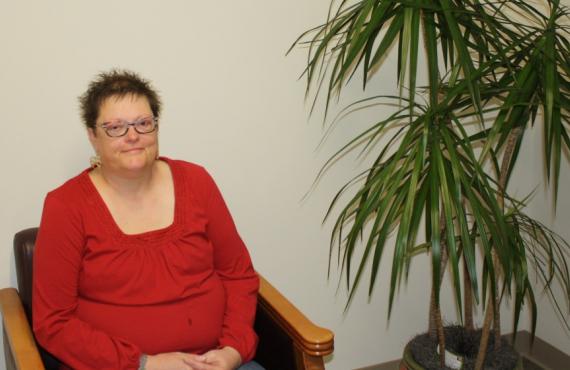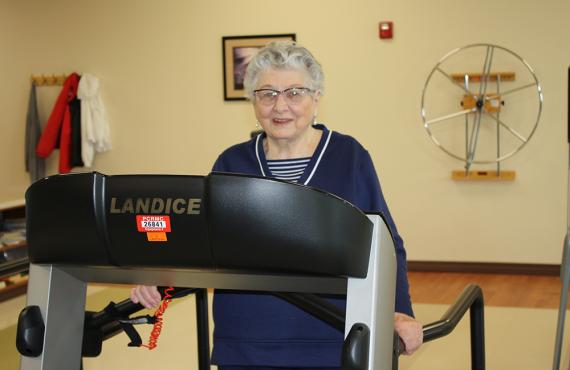Published on December 1, 2023

Read Time: 4 Minutes
Three Things to Know
- Non-small cell lung cancer is more common, accounting for nearly 85% of all cases of lung cancer, while small cell lung cancer makes up about 10% to 15% of cases.
- Small cell lung cancer is more aggressive, and symptoms usually appear quicker.
- Small cell lung cancer is more common in heavy smokers.
By Jinna Lisenbe, AGPCNP-BC
Phelps Health
Did you know? Lung cancer is not only the third most common cancer in the US, but also the leading cause of cancer-related deaths. And when you look at the overall top causes of death among Americans, the only disease deadlier than lung cancer is heart disease.
By the end of 2023, the American Cancer Society estimates about 238,000 new cases of lung cancer will be diagnosed and 127,000 people will die from the disease.
If you’re diagnosed with lung cancer, you will have one of two main types: small cell lung cancer (SCLC) or non-small cell lung cancer (NSCLC). The names come from how the type of cancer appears under a microscope.
So, what’s the difference between the two?
How common is each type of lung cancer?
NSCLC is more common, accounting for nearly 85% of all cases of lung cancer. The other type, SCLC, makes up only about 10% to 15% of cases.

Does SCLC or NSCLC spread quicker?
While SCLC is less common, this type of cancer is typically more aggressive, with symptoms appearing quicker. SCLC also is more likely to spread to other areas of the body, such as your lymph nodes, bones, brain, liver and adrenal glands (found on top of your kidneys).
What are the risk factors for each type of lung cancer?
The National Institutes of Health estimates that smoking accounts for 90% of all lung cancer cases. SCLC is more common in heavy smokers (someone who smokes at least one pack of cigarettes per day).
The earlier you start smoking, the longer you smoke and the more often you smoke, the higher your risk is for developing lung cancer.
On the other hand, quitting smoking lowers your risk of getting lung cancer. If you stop smoking, your chances of survival and treatment effectiveness will improve if you were to develop lung cancer.
Do symptoms of SCLC or NSCLC differ?
Symptoms of lung cancer include a cough that gets worse or doesn’t go away, shortness of breath, wheezing, coughing up blood, chest pain, feeling tired and weight loss with no known cause.
Oftentimes, people don’t have symptoms of lung cancer until the disease has progressed to later stages.
Because SCLC tends to grow more rapidly, people with this diagnosis may have a sudden onset or a rapid worsening of symptoms.
How is each type of lung cancer diagnosed?
Lung cancer is typically identified with an X-ray, CT (computed tomography) scans, PET (positron emission tomography) scans and/or an MRI (magnetic resonance imaging) scan.
A biopsy of a lung mass or lymph nodes is used to confirm the diagnosis.
Pathologists (doctors who specialize in the causes and effects of diseases) will look at the biopsy under a microscope and perform special tests to confirm whether the cancer started in the lungs. These tests also can further identify whether the type is SCLC or NSCLC.
Are treatments for SCLC or NSCLC different?
Treatment for both types of lung cancer may include surgery, chemotherapy, radiation or immunotherapy. Patients will often need a combination of these treatments.
The type of chemotherapy and number of radiation treatments may vary for patients with SCLC and NSCLC. Additionally, treatment may differ based on the cancer’s stage and whether the disease has spread to your lymph nodes or other parts of your body.
While surgery, chemotherapy and radiation are still often needed to treat lung cancer, immunotherapy and targeted therapy have changed how patients with advanced stage lung cancer are treated.
Immunotherapy is treatment that uses a person’s own immune system to fight cancer. Targeted therapy is a type of cancer treatment that uses drugs or other substances to precisely identify or attack certain types of cancer cells.
Screening for lung cancer can help detect the condition before symptoms start. Lung cancer is more treatable when found in its early stages. Talk to your provider to see if lung cancer screening is right for you.
Find a Cancer Care Specialist
Jinna Lisenbe, AGPCNP-BC, is an adult-gerontology primary care nurse practitioner who specializes in radiation oncology at Phelps Health. Learn more about Phelps Health cancer care services.

